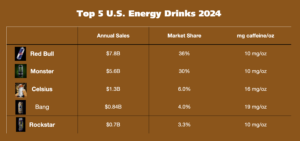The Most Profitable Convenience Store Product? Caffeinated, but not coffee.
Posted on | April 7, 2025 | No Comments
Mike Magee

If you enter a Starbucks or Dunkin’ Donuts on any given day, it is more than likely that you will exit with roughly half the maximum recommended daily dosage of caffeine in a hot or cold coffee beverage. No surprise here.
But you may be surprised to know that your caffeine hit is likely to be just as high (or higher) if you visit a Convenience Market like 7-Eleven or Cumberland Farms, but not from a cup of coffee. This is because 1/3 of all beverage sales in these outlets is in the form of caffeine super-charged energy drinks. More on that in a moment.
Convenience stores, often associated with easy access gas pumps, are ubiquitous is most parts of our nation. Take the tiny state of Rhode Island. At last tally, it has 617 Convenience stores, and that’s an increase of 1 1/4 % over last year. 279 of these stores (45%) are single-owner operations.
Packaged beverages account for roughly 16% of sales. That’s second only to cigarette sales. And when it comes to profitability, beverages are #1, contributing a whopping 20% of gross dollar sales. And among all beverages, the leader of the pack in profit margins is – you guessed it – energy drinks at 44%.
Total U.S. sales of energy drinks in 2024 was nearly 22 billion dollars. These beverages come in variety of sizes, are usually canned and refrigerated, and are packed with extras.For example, one brand (Celsius) listed in the chart above includes the following additives: Citric Acid, Taurine (an amino acid),Green Tea extract, Ascorbic Acid (Vitamin C), the artificial sweetener Sucralose, the metabolite Glucuronolactone, ginger root extract, and of course a range of vitamins and artificial flavors.
To their young fans, taste is secondary to increased attention and reaction speed. These are due to the heavy dose of caffeine. Other promised effects, like increased muscle strength and endurance, are not supported by data. What has been well documented is that exceeding a daily dose of 400mg of caffeine can cause problems including cardiac irregularities, anxiety and panic disorders, and GI disturbances.
There are currently no federal age requirements for the purchase of energy drinks.
Tags: bang > caffeine > celsius > Energy Drinks > monster > performance drinks convenience stores > red bull > rockstar > teen health
Comments
Leave a Reply


